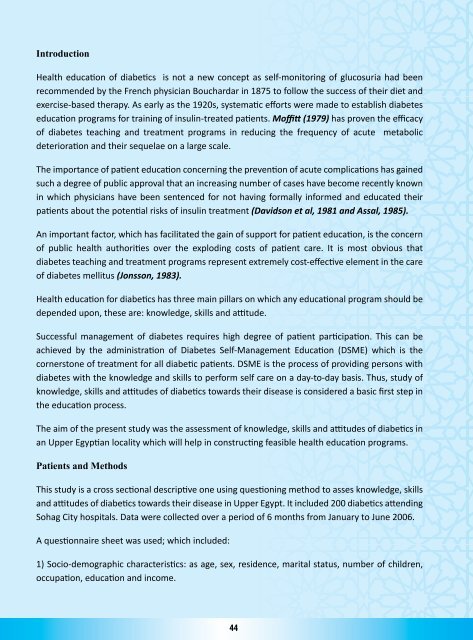Download Booklet - Diabetes in Asia Study Group
Download Booklet - Diabetes in Asia Study Group
Download Booklet - Diabetes in Asia Study Group
You also want an ePaper? Increase the reach of your titles
YUMPU automatically turns print PDFs into web optimized ePapers that Google loves.
Introduction<br />
health education of diabetics is not a new concept as self-monitor<strong>in</strong>g of glucosuria had been<br />
recommended by the french physician bouchardar <strong>in</strong> 1875 to follow the success of their diet and<br />
exercise-based therapy. as early as the 1920s, systematic efforts were made to establish diabetes<br />
education programs for tra<strong>in</strong><strong>in</strong>g of <strong>in</strong>sul<strong>in</strong>-treated patients. Moffitt (1979) has proven the efficacy<br />
of diabetes teach<strong>in</strong>g and treatment programs <strong>in</strong> reduc<strong>in</strong>g the frequency of acute metabolic<br />
deterioration and their sequelae on a large scale.<br />
the importance of patient education concern<strong>in</strong>g the prevention of acute complications has ga<strong>in</strong>ed<br />
such a degree of public approval that an <strong>in</strong>creas<strong>in</strong>g number of cases have become recently known<br />
<strong>in</strong> which physicians have been sentenced for not hav<strong>in</strong>g formally <strong>in</strong>formed and educated their<br />
patients about the potential risks of <strong>in</strong>sul<strong>in</strong> treatment (Davidson et al, 1981 and Assal, 1985).<br />
an important factor, which has facilitated the ga<strong>in</strong> of support for patient education, is the concern<br />
of public health authorities over the explod<strong>in</strong>g costs of patient care. it is most obvious that<br />
diabetes teach<strong>in</strong>g and treatment programs represent extremely cost-effective element <strong>in</strong> the care<br />
of diabetes mellitus (Jonsson, 1983).<br />
health education for diabetics has three ma<strong>in</strong> pillars on which any educational program should be<br />
depended upon, these are: knowledge, skills and attitude.<br />
successful management of diabetes requires high degree of patient participation. this can be<br />
achieved by the adm<strong>in</strong>istration of <strong>Diabetes</strong> self-Management education (DsMe) which is the<br />
cornerstone of treatment for all diabetic patients. DsMe is the process of provid<strong>in</strong>g persons with<br />
diabetes with the knowledge and skills to perform self care on a day-to-day basis. thus, study of<br />
knowledge, skills and attitudes of diabetics towards their disease is considered a basic first step <strong>in</strong><br />
the education process.<br />
the aim of the present study was the assessment of knowledge, skills and attitudes of diabetics <strong>in</strong><br />
an upper egyptian locality which will help <strong>in</strong> construct<strong>in</strong>g feasible health education programs.<br />
Patients and Methods<br />
this study is a cross sectional descriptive one us<strong>in</strong>g question<strong>in</strong>g method to asses knowledge, skills<br />
and attitudes of diabetics towards their disease <strong>in</strong> upper egypt. it <strong>in</strong>cluded 200 diabetics attend<strong>in</strong>g<br />
sohag City hospitals. Data were collected over a period of 6 months from January to June 2006.<br />
a questionnaire sheet was used; which <strong>in</strong>cluded:<br />
1) socio-demographic characteristics: as age, sex, residence, marital status, number of children,<br />
occupation, education and <strong>in</strong>come.<br />
44


